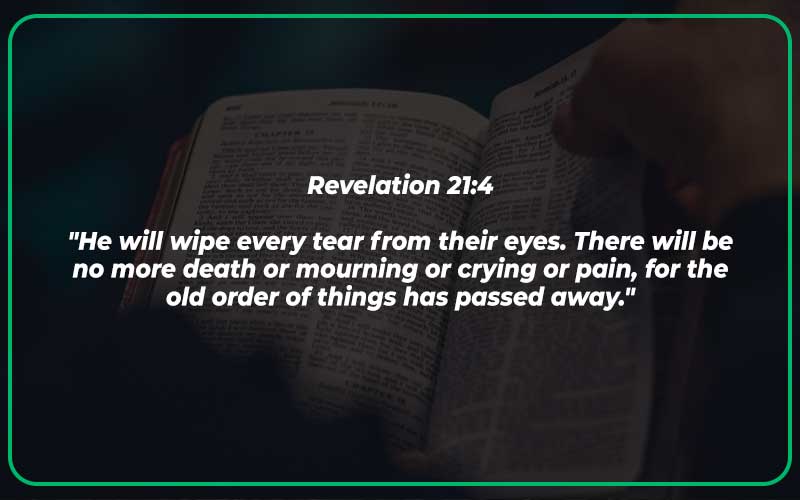Regret is a universal emotion that we all experience at some point in our lives. It can weigh us down with feelings of guilt and sadness, making it difficult to move forward. However, the Bible offers guidance and wisdom on how to deal with regret.
Today, we will explore some powerful Bible verses about regret that can offer comfort, hope, and encouragement during difficult times. Let’s dive in and discover what the scripture has to say about overcoming regret.
Bible Verses About Regret
Psalm 38:18
“I confess my iniquity; I am troubled by my sin.”
This verse expresses the deep regret and troubled heart that comes with recognizing and confessing our sins. It reminds us that regret is a natural response to the acknowledgment of our wrongdoing.
Proverbs 14:30
“A heart at peace gives life to the body, but envy rots the bones.”
Regret often stems from feelings of envy or comparison, which can lead to dissatisfaction and discontent. This verse teaches us the importance of having a peaceful heart and avoiding envy to prevent the rotting effects it can have on our well-being.
Ecclesiastes 7:3
“Sorrow is better than laughter, because a sad face is good for the heart.”
While it may seem counterintuitive, this verse suggests that experiencing sorrow and regret can ultimately be beneficial for our hearts. It encourages us to reflect on our actions and make necessary changes in order to find true joy and fulfillment.
Isaiah 55:7
“Let the wicked forsake their ways and the unrighteous their thoughts. Let them turn to the LORD, and he will have mercy on them, and to our God, for he will freely pardon.”
This verse offers hope and forgiveness to those who regret their past actions. It emphasizes the power of repentance and the willingness of God to extend mercy and pardon when we turn away from our wickedness.
Jeremiah 31:19
“After I strayed, I repented; after I came to understand, I beat my breast. I was ashamed and humiliated because I bore the disgrace of my youth.”
This verse illustrates the genuine remorse and deep regret of someone who recognizes their past mistakes. It demonstrates the personal growth that can come from acknowledging our wrongdoings and seeking repentance.
Joel 2:13
“Rend your heart and not your garments. Return to the LORD your God, for he is gracious and compassionate, slow to anger and abounding in love, and he relents from sending calamity.”
Regret should go beyond mere outward expressions or gestures. This verse emphasizes the need to truly repent from the heart and turn towards God for His abundant grace, compassion, and love.
Matthew 27:3-4
“When Judas, who had betrayed him, saw that Jesus was condemned, he was seized with remorse and returned the thirty pieces of silver to the chief priests and the elders. ‘I have sinned,’ he said, ‘for I have betrayed innocent blood.'”
This verse portrays the moment of deep regret and remorse experienced by Judas after betraying Jesus. It reminds us that regret is often accompanied by a realization of the gravity of our actions and the need for repentance and reconciliation.
Luke 22:62
“And he went outside and wept bitterly.”
Regret can manifest in tears and overwhelming emotions. This verse describes Peter’s response when he realized that he had denied Jesus, highlighting the intense sorrow and remorse he felt in that moment.
Acts 2:38
“Peter replied, ‘Repent and be baptized, every one of you, in the name of Jesus Christ for the forgiveness of your sins. And you will receive the gift of the Holy Spirit.”
In this verse, Peter acknowledges the importance of repentance as a means to receive forgiveness. It reminds us that true remorse should lead us to seek repentance, baptism, and the indwelling guidance of the Holy Spirit.
2 Corinthians 7:10
“Godly sorrow brings repentance that leads to salvation and leaves no regret, but worldly sorrow brings death.”
This verse contrasts godly sorrow, which leads to genuine repentance and salvation, with worldly sorrow, which brings forth death. It teaches us that the kind of regret that leads to positive change is rooted in a deep desire for reconciliation with God.
James 4:8-10
“Come near to God and he will come near to you. Wash your hands, you sinners, and purify your hearts, you double-minded. Grieve, mourn and wail. Change your laughter to mourning and your joy to gloom. Humble yourselves before the Lord, and he will lift you up.”
This verse urges us to approach God with a contrite heart and genuine repentance. It encourages mourning over our sins in order to experience the transformative power of God’s grace and the lifting up that comes from humble surrender.
1 John 1:9
“If we confess our sins, he is faithful and just and will forgive us our sins and purify us from all unrighteousness.”
This verse offers reassurance that if we confess our sins, God is faithful to forgive us and cleanse us from all unrighteousness. It reminds us that regret should lead to sincere confession and the assurance of God’s forgiveness.
Job 42:6
“Therefore I despise myself and repent in dust and ashes.”
Job’s response to his encounter with God’s majesty and wisdom is deep regret and repentance. This verse reminds us that true regret should humble us and lead us to recognize our need for repentance and submission before the Almighty.
Psalm 51:17
“My sacrifice, O God, is a broken spirit; a broken and contrite heart you, God, will not despise.”
This verse emphasizes the significance of a broken and contrite heart as a sacrifice pleasing to God. It reminds us that genuine regret leads to humility and a willingness to yield to God’s will, which He welcomes with open arms.
Luke 15:18-19
“I will set out and go back to my father and say to him: Father, I have sinned against heaven and against you. I am no longer worthy to be called your son; make me like one of your hired servants.”
These words spoken by the prodigal son reflect his recognition of his sins and his desire for reconciliation. They teach us that regret should prompt us to turn back to our heavenly Father, acknowledging our unworthiness and seeking His mercy.

Romans 2:4
“Or do you show contempt for the riches of his kindness, forbearance, and patience, not realizing that God’s kindness is intended to lead you to repentance?”
This verse reminds us that God’s kindness and patience are intended to lead us to repentance. It prompts introspection, encouraging us to respond to His love and grace with heartfelt regret and a desire to turn away from our sins.
1 Peter 2:24
“He himself bore our sins in his body on the cross, so that we might die to sins and live for righteousness; by his wounds, you have been healed.”
This verse reminds us of the redemptive work of Jesus on the cross. It assures us that through His sacrifice, we can be freed from our sins and live a righteous life. It offers hope for those burdened by regret, knowing that Christ’s wounds bring healing and restoration.
Psalm 32:5
“Then I acknowledged my sin to you and did not cover up my iniquity. I said, ‘I will confess my transgressions to the LORD.’ And you forgave the guilt of my sin.”
This verse speaks of the relief and freedom that comes with confessing our sins to God. It encourages us to confront our regrets and openly acknowledge our transgressions, knowing that God is faithful to forgive and cleanse us from all guilt.
2 Samuel 24:10
“David was conscience-stricken after he had counted the fighting men, and he said to the LORD, ‘I have sinned greatly in what I have done. Now, LORD, I beg you, take away the guilt of your servant. I have done a very foolish thing.’“
This verse depicts David’s remorse and realization of his foolish actions. It teaches us that regret often arises from recognizing the gravity of our sins and the need to seek God’s forgiveness and restoration.
Psalm 34:18
“The LORD is close to the brokenhearted and saves those who are crushed in spirit.”
Regret can lead to a broken heart, but this verse assures us that in those times, the Lord draws near to us and brings salvation and healing to our crushed spirits. It reminds us that God’s compassion and love are readily available to those who are repentant.
Isaiah 12:1
“In that day you will say: ‘I will praise you, LORD. Although you were angry with me, your anger has turned away and you have comforted me.”
This verse speaks of the comfort and restoration that come after experiencing God’s righteous anger as a result of our regrettable actions. It encourages us to offer praise and thanksgiving for His forgiveness, mercy, and comforting presence in our lives.
Luke 7:47
“Therefore, I tell you, her many sins have been forgiven—as her great love has shown. But whoever has been forgiven little loves little.”
This verse highlights the connection between the extent of forgiveness and love. It teaches us that those who have experienced great forgiveness tend to love much in response. Regret and forgiveness can lead to a deep, transformative love for God and others.
Luke 18:13
“But the tax collector stood at a distance. He would not even look up to heaven but beat his breast and said, ‘God, have mercy on me, a sinner.’“
The tax collector’s humble prayer serves as an example of genuine regret and recognition of one’s own sinfulness. It reminds us that a contrite heart and a plea for God’s mercy are key elements in the process of finding forgiveness and redemption.
Acts 3:19
“Repent, then, and turn to God, so that your sins may be wiped out, that times of refreshing may come from the Lord.”
This verse emphasizes the importance of repentance and the promises that come with turning to God. It assures us that by acknowledging our sins and seeking repentance, our sins can be forgiven, and we can experience a refreshing and renewal through the Lord’s grace.
James 5:16
“Therefore confess your sins to each other and pray for each other so that you may be healed. The prayer of a righteous person is powerful and effective.”
This verse encourages us to openly confess our sins to one another and seek prayer for healing. It reminds us that sharing our struggles and regrets with trusted fellow believers can lead to spiritual restoration and powerful breakthroughs in our lives.
Revelation 21:4
“He will wipe every tear from their eyes. There will be no more death or mourning or crying or pain, for the old order of things has passed away.”
This verse offers hope for the future, speaking of a time when all regret will be wiped away. It reminds us that in the presence of God, all sorrow and pain will vanish, replaced with eternal joy and peace.

Psalm 34:4
“I sought the LORD, and he answered me; he delivered me from all my fears.”
This verse testifies to the faithfulness of God in answering those who earnestly seek Him. It assures us that when we approach God with our regrets and fears, He will deliver us and grant us the peace and assurance we long for.
Lamentations 3:40
“Let us examine our ways and test them, and let us return to the LORD.”
This verse calls us to self-reflection and self-examination. It challenges us to honestly assess our actions and motivations, leading us to return to the Lord in repentance and surrender.
Also Read: 30 Bible Verses About Redemption (With Commentary)
What Does the Bible Say About Regret?
In the Bible, we can find several teachings and stories that touch upon the concept of regret. Regret is often portrayed as a deep sense of sorrow or remorse over past actions or decisions. While the Bible doesn’t use the word “regret” explicitly in many instances, it provides guidance and wisdom on how we should approach our feelings of remorse and how to find redemption and forgiveness.
- Repentance: The Bible emphasizes the importance of repentance when we recognize our sins or mistakes. In 2 Corinthians 7:10, it says, “For godly grief produces a repentance that leads to salvation without regret, whereas worldly grief produces death.” This verse reminds us that true repentance leads to a path free from regret, as it brings us closer to God’s forgiveness.
- Forgiveness: One of the central themes in the Bible is forgiveness. When we genuinely repent and seek God’s forgiveness, we are assured of His mercy and grace. Psalm 51:10 says, “Create in me a clean heart, O God, and renew a right spirit within me.” This verse shows that through seeking forgiveness, we can find renewal and healing for our regrets.
- Learning from Mistakes: The Bible also encourages us to learn from our past mistakes and use them as opportunities for growth. In Philippians 3:13-14, Paul writes, “Brothers, I do not consider that I have made it my own. But one thing I do: forgetting what lies behind and straining forward to what lies ahead, I press on toward the goal for the prize of the upward call of God in Christ Jesus.” This verse teaches us not to dwell on our regrets but to focus on our journey of faith.
- God’s Unconditional Love: Perhaps one of the most comforting aspects of the Bible is the reminder of God’s unconditional love for us. Romans 8:38-39 states, “For I am sure that neither death nor life, nor angels nor rulers, nor things present nor things to come, nor powers, nor height nor depth, nor anything else in all creation, will be able to separate us from the love of God in Christ Jesus our Lord.” This assures us that even in our moments of regret, God’s love remains steadfast.
In summary, the Bible acknowledges that we may experience regret in our lives, but it offers a path of repentance, forgiveness, and growth. We are encouraged not to dwell on our regrets but to turn to God, who offers love, forgiveness, and the opportunity to learn and grow from our past mistakes.

